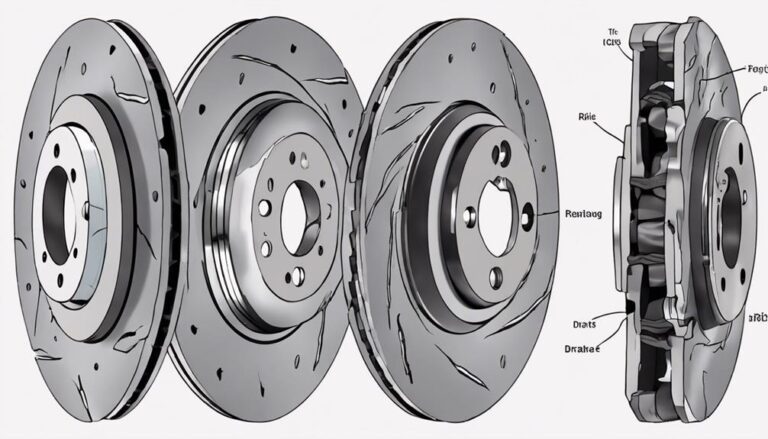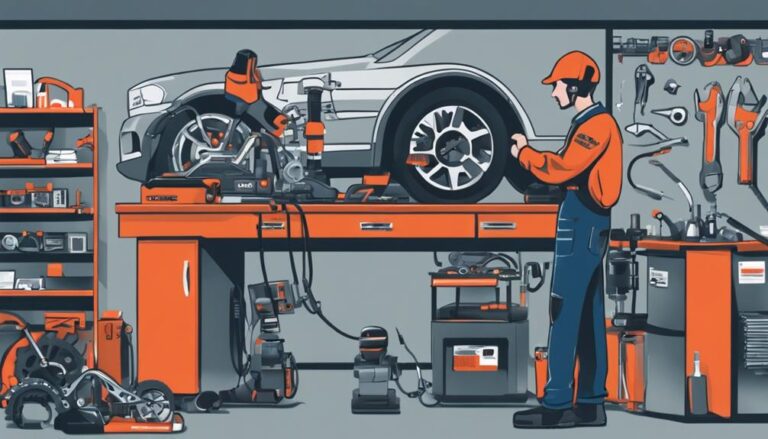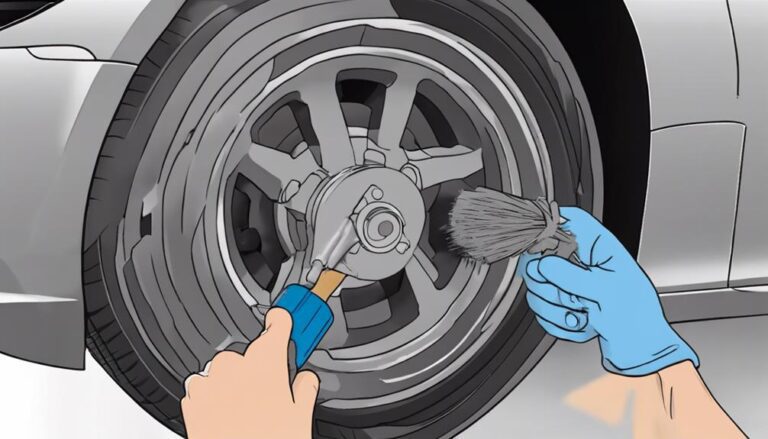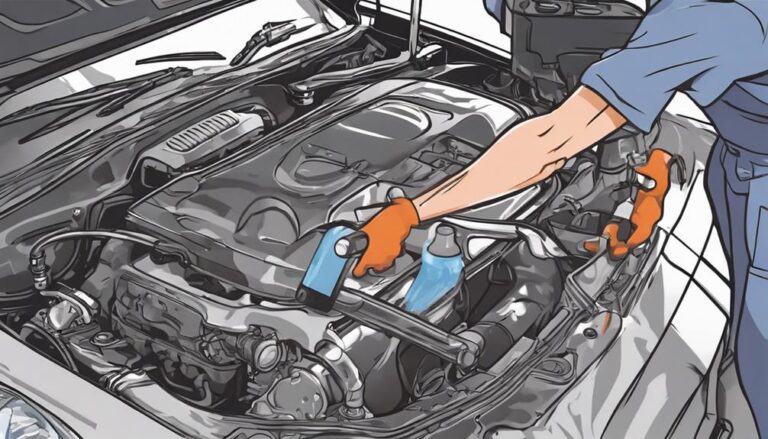Why Is Winter Brake System Maintenance Important?
When it comes to winter brake system maintenance, it's like preparing your vehicle for a chilly obstacle course. The cold season presents unique challenges that can directly impact your brakes' effectiveness.
From icy roads to corrosive salt treatments, your braking system faces a series of hurdles that demand attention.
Stay tuned to discover why overlooking winter brake maintenance could lead to more than just a bumpy ride.
Key Takeaways
- Cold weather challenges impact brake performance and safety.
- Snow, ice, and road salt can degrade brake components.
- Neglecting maintenance increases accident risks in winter.
- Regular checks and care ensure optimal brake system function.
Importance of Winter Brake System Maintenance
Why is winter brake system maintenance crucial for your safety on the road?
Cold weather challenges can significantly impact brake performance, making safety precautions essential. Snow and ice build-up can affect brake responsiveness, potentially leading to longer stopping distances. Regular maintenance is vital to ensure your brakes are functioning optimally in these conditions.
Additionally, road salt exposure during winter can corrode brake components, compromising their effectiveness. Moisture from melting snow can also seep into the brake system, diluting the brake fluid and reducing its ability to transmit hydraulic pressure effectively.
Ignoring winter brake system maintenance can pose significant risks when driving on icy or snowy roads, as compromised brakes can lead to accidents. To stay safe on winter roads, make sure your brake system is well-maintained and functioning correctly to handle the challenges brought by cold weather conditions.
Winter Brake System Care Tips
To ensure your safety and maintain optimal brake performance in cold and icy conditions, implementing effective winter brake system care tips is imperative. Two key aspects to focus on during winter are brake pad inspection and understanding anti-lock braking systems. Regularly checking your brake pads for wear and tear is essential to ensure they can effectively grip the rotors and provide adequate stopping power. Additionally, understanding how anti-lock braking systems work can help you maximize their efficiency on slippery surfaces.
| Winter Brake System Care Tips | ||
|---|---|---|
| 1. Brake Pad Inspection | 2. Anti-lock Braking Systems | 3. Regular Maintenance |
| Check brake pads for wear regularly. | Understand how ABS functions for better control in icy conditions. | Maintain your braking system throughout winter. |
Key Steps for Winter Brake Maintenance
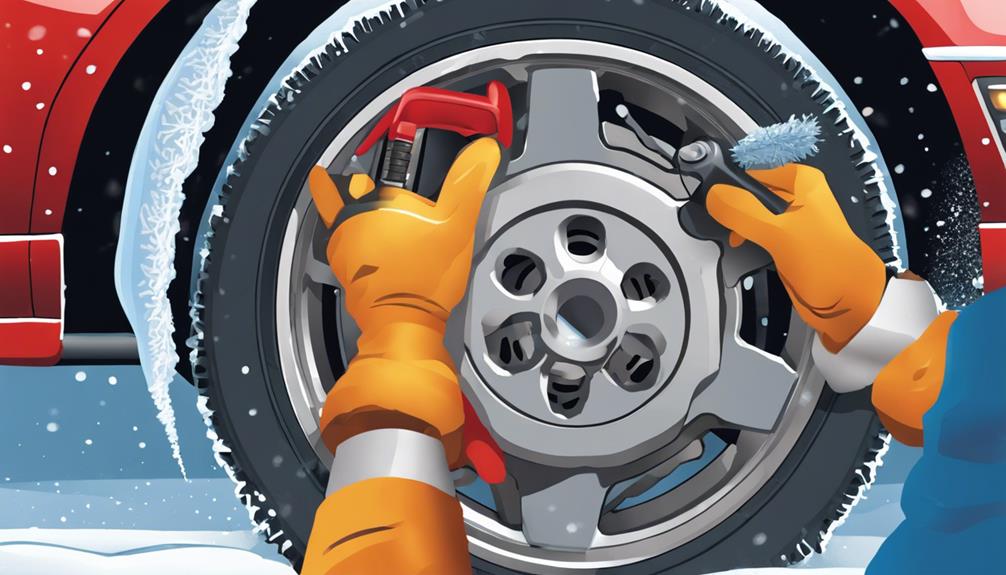
What're the essential key steps to ensure optimal winter brake maintenance for your vehicle's safety and performance in cold and icy conditions?
- Brake Inspection: Start by inspecting the brake pads, rotors, and calipers for wear and tear. Look for any signs of damage or corrosion caused by winter elements.
- Fluid Check: Check the brake fluid level and quality. Cold weather can affect fluid viscosity, impacting brake performance. Ensure the fluid is at the correct level and free from moisture.
- Pad and Rotor Cleaning: Clean brake pads and rotors to remove any salt, grime, or debris buildup. These contaminants can compromise braking efficiency in winter conditions.
- Caliper Greasing: Apply a thin layer of high-temperature brake grease to the caliper slides. This helps prevent sticking or freezing of the calipers, ensuring smooth brake operation in cold weather.
Ensuring Brake Safety in Winter
Inspecting and maintaining your vehicle's brake system during winter is critical to ensuring optimal safety and performance in cold and icy conditions. Cold weather can significantly impact brake responsiveness, making preventative measures essential to avoid potential dangers on winter roads. Road salt used for de-icing can accelerate corrosion on brake components, emphasizing the need for regular checks to address any issues promptly.
Additionally, snow and ice buildup can affect brake performance, highlighting the importance of ensuring your brakes are in top condition. Moisture from melting snow can penetrate brake systems, leading to potential malfunctions if not properly maintained. Ignoring brake safety in winter can increase the risk of brake failure when you need them the most, especially on slippery surfaces.
Winter Brake System Maintenance Guide
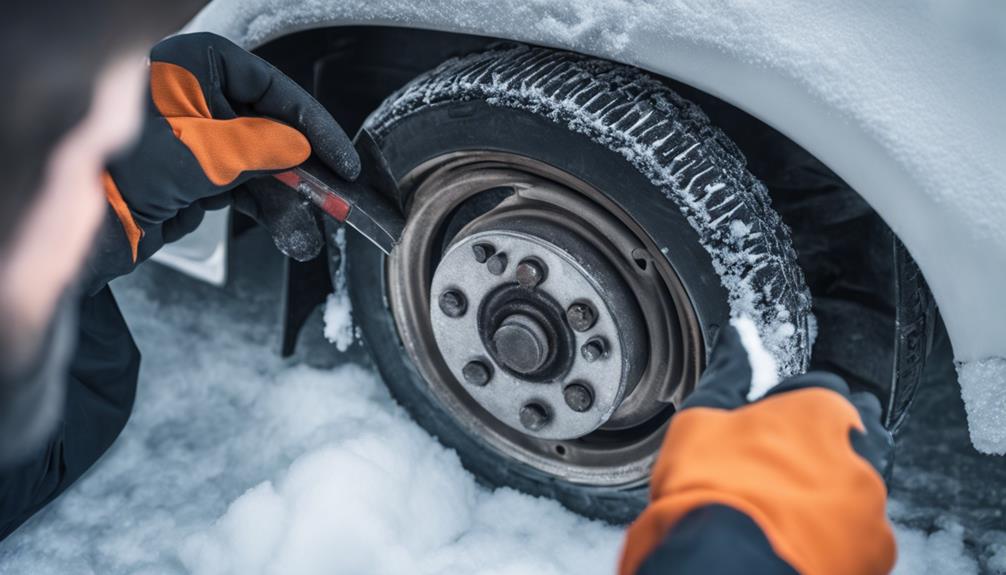
When preparing for winter driving, ensuring your vehicle's brake system is properly maintained is essential for optimal safety and performance in cold and icy conditions. Here is a winter brake system maintenance guide:
- Brake Inspection: Regularly check brake pads, rotors, and brake fluid levels to ensure they're in good condition and functioning correctly.
- Anti Corrosion Treatment: Apply anti-corrosion treatment to brake components to protect them from the damaging effects of road salt and moisture exposure.
- Moisture Prevention: Keep the brake system dry to prevent moisture buildup, which can affect brake performance in winter conditions.
- Professional Maintenance: Schedule regular professional winter brake system maintenance to address issues like uneven brake wear, moisture-related problems, and reduced braking effectiveness.
Frequently Asked Questions
Why Is Brake System Maintenance Important?
Regular brake system maintenance is essential. It prevents accidents and ensures performance. Evaluating brake pad wear and replacing them when needed, along with proper fluid maintenance, keeps your vehicle safe and operational. Trust qualified professionals for this crucial task.
Why Is Winter Maintenance Important?
In winter, snow removal is essential for safety. Tire pressure affects traction on icy roads. Regular maintenance ensures optimal brake performance, crucial for stopping in cold conditions. Don't overlook these tasks to keep you safe on winter roads.
How Does Cold Weather Affect Brakes?
In cold weather, brake performance can suffer due to temperature sensitivity. Low temperatures affect brake fluid viscosity, reducing braking efficiency. Moisture build-up from snow and ice can compromise response time. Regular maintenance ensures optimal function and safety.
How Important Is Brake Service?
Maintaining your brakes is crucial for brake safety. Regular service ensures optimal performance, enabling effective emergency stop techniques. Ignoring brake maintenance risks accidents. Don't overlook this vital aspect of winter driving. Keep safe on icy roads.
Conclusion
In conclusion, ensuring proper winter brake system maintenance is essential to keep you safe on the icy roads. Remember, 'An ounce of prevention is worth a pound of cure.'
By following the care tips and key steps outlined in this guide, you can ensure your brakes are in top condition for the winter season, providing you with the necessary stopping power when you need it most.
Stay safe and drive with confidence this winter.



